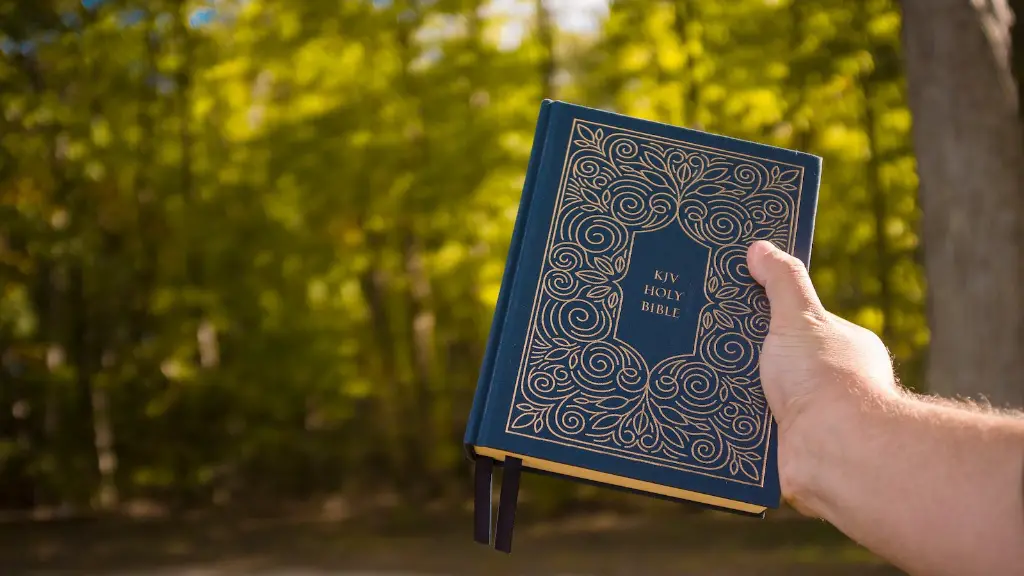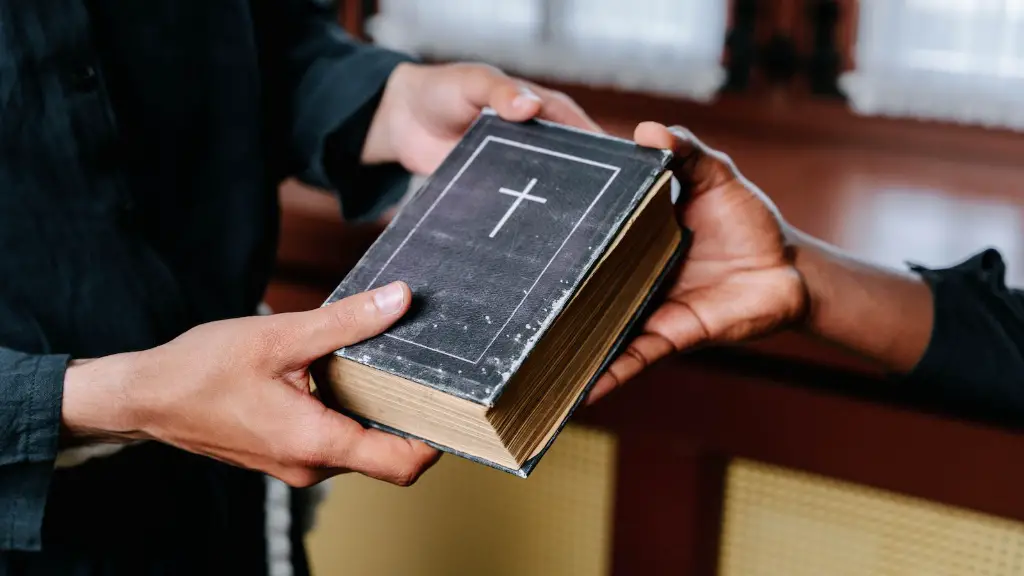History of Ishmael in the Bible
Ishmael is a central figure in the Old Testament, as the son of Abraham, who is widely seen as the father of the three monotheistic religions: Christianity, Judaism, and Islam. He first appears in the Genesis 16, after Sarah, Abraham’s wife, is unable to conceive. Sarah encourages Abraham to sleep with Hagar, Sarah’s Egyptian handmaid. From there, Ishmael is born. His birth is seen as the beginning of a long history between the patriarchs and their descendants, which is also an important theme in the Bible.
Ishmael’s life is one of contrasts. On the one hand, he is viewed as an illegitimate child, though he is Abraham’s legal son according to Jewish law. On the other hand, Ishmael is considered to be the father of the Arab nations, and the Bible says he is the ancestor of a great nation. He is the father of twelve sons, who become the founders of several nomadic Arab tribes.
The story of Ishmael’s life continues from Genesis 16 to Genesis 25. Though his mother, Hagar, is instructed by God to leave him and Abraham, Abraham sends them away with gifts, and God promises to make a great nation out of Ishmael. Later on in the text, God repeats this promise to Abraham to make Ishmael’s descendants a great nation.
Symbology of Ishmael
Ishmael is a major symbol in the Bible, and his story is one with multiple interpretations. His life is often seen as a symbol for the relationship between Jews and Arabs in the Middle East. On a more spiritual level, Ishmael is seen as a symbol of salvation, of someone coming from a difficult and uncertain place and being blessed with God’s favor.
Because of his status as a symbol of both blessing and oppression, Ishmael has been used extensively by theologians, authors, and artists to explore issues of faith, identity, and belonging. He is featured prominently in the writings of C.S. Lewis and in the works of Spanish poet Federico García Lorca. He is a significant figure in Kurt Vonnegut’s novel Slaughterhouse-Five, in which the character Billy Pilgrim travels back and forth in time.
Additionally, Ishmael is used to symbolize the struggle of the Jewish people, who have faced marginalization and oppression throughout their history. Ishmael’s status as an outcast from Abraham’s house is seen as a metaphor for the times when Jews were excluded or persecuted in different societies. Ishmael is also seen as a symbol of strength and perseverance in the face of struggle, ultimately finding his own path.
Ishmael in Christianity
Ishmael is a significant figure in Christianity, and this is largely due to his prominent place in the Old Testament. Ishmael plays an important role in the story of Jesus’s birth, when an angel visits Mary, Jesus’s mother, and announces that she will be the mother of the savior. Mary agrees to take on the task, despite being unmarried and not being able to explain why a savior needs to be born. This story echoes Ishmael’s story, in which God speaks to Abraham’s wife Hagar, telling her that she will be the mother of a great nation.
Ishmael is also a symbol of hope and salvation in Christianity. His story is seen as a reminder that God can intervene in our lives and bring good from difficult circumstances. It is a testament to God’s mercy and grace, and His ability to see beyond the immediate and bring hope and healing even in difficult times.
Ishmael in Islam
Ishmael’s place in the Qur’an is different than his role in the Bible. In the Qur’an, Ishmael is seen as a prophet who is the son of Abraham and the ancestor of the Prophet Muhammad. He is seen as a major figure in Islam, and his story is recounted multiple times in the Qur’an. He is seen as an example of faith and courage, and he is mentioned in the same surah as the Prophet Muhammad.
Ishmael is seen as an important bridge between Judaism and Islam. He is seen as a prophet with divine wisdom, and his story is a reminder of God’s power and mercy. His life serves as a bridge between the two faiths, with his story being told in both the Bible and the Qur’an.
Ishmael’s Impact on Culture
Ishmael is a powerful figure in both religious and literary tradition. His story can be found in works by authors such as C. S. Lewis and Nathaniel Hawthorne, and his name has been used to name places, ships, and people. The name Ishmael is also used in works of literature to denote a sense of alienation and isolation, and it is a popular name in many parts of the world.
Ishmael has had a significant impact on popular culture as well. He has been featured in films and television shows, most notably in Ridley Scott’s film, The Counselor. Ishmael is also featured in more contemporary works, such as the novel, If I Stay, which features Ishmael as a source of comfort in the protagonist’s search for meaning.
Ishmael in Jewish Culture
Ishmael is an important figure in Judaism as well. In Jewish tradition, Ishmael is often seen as a symbol of faith and perseverance in the face of hardship. Jews see Ishmael as a reminder that God provides hope and redemption despite difficult times. Ishmael is also seen as a symbol of loyalty and courage, as he was willing to give up his life to save Abraham.
There is a Jewish tradition which states that Ishmael converted to Judaism eventually, and that he and his descendants were seen as righteous and devoted followers of the faith. This notion is reflected in some modern Jewish communities, where Ishmael is seen as a figure that Jews can relate to and look to for guidance and inspiration.
Traditional Beliefs Surrounding Ishmael
Ishmael is a figure surrounded by traditional folk beliefs in many cultures. For example, there is a folk belief in parts of Central Asia that Ishmael was the protector of travelers on a journey. He is seen as a symbol of protection and strength, and a sign of God’s presence even in difficult and dangerous times.
In some parts of the Middle East, Ishmael is also seen as a symbol of courage and fortitude. In Arab culture, Ishmael is seen as a symbol of pride and independence. His journey from being an illegitimate son of Abraham to becoming the ancestor of a great nation is seen as an inspirational story of resilience and hope in the face of adversity.
Traditional Rituals Connected to Ishmael
Ishmael is associated with numerous traditional rituals and customs. For example, Jewish men on their wedding day often read the story of Ishmael as a blessing and pray that their marriage will be blessed as Ishmael’s was. Additionally, in Yemenite and Moroccan Jewish communities, the name Ishmael is sometimes used as a blessing to parents upon the birth of their son.
In Islamic culture, Ishmael is associated with the annual Hajj pilgrimage to Mecca. Ishmael and his mother Hagar are seen as important figures in the pilgrimage and their story is often recounted in rituals surrounding the Hajj. In some parts of the Islamic world, it is also common to sing a verse from the Qur’an during the ritual: “Verily, God has heard the plea of Ishmael, and his plea has been answered.”
Conclusion
Ishmael is a powerful figure in both religious and literary tradition. His story is one of conflict and challenge, but also of hope and grace. Ishmael is widely seen as the father of the three monotheistic religions, and his life is seen as an example of courage and faith in the face of hardship. In addition, Ishmael is surrounded by traditional folk beliefs and associated with various traditional rituals. Ishmael is a powerful symbol of perseverance and hope, and his story continues to speak to many people today.


